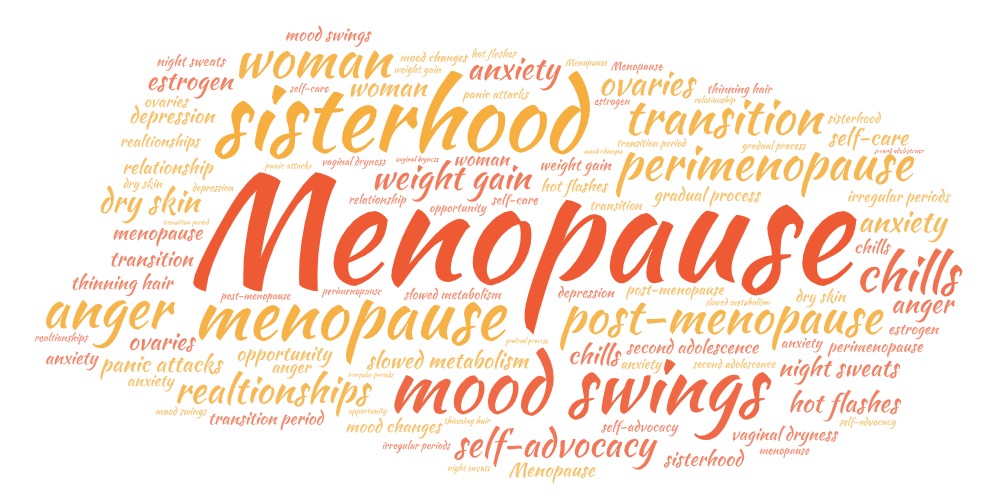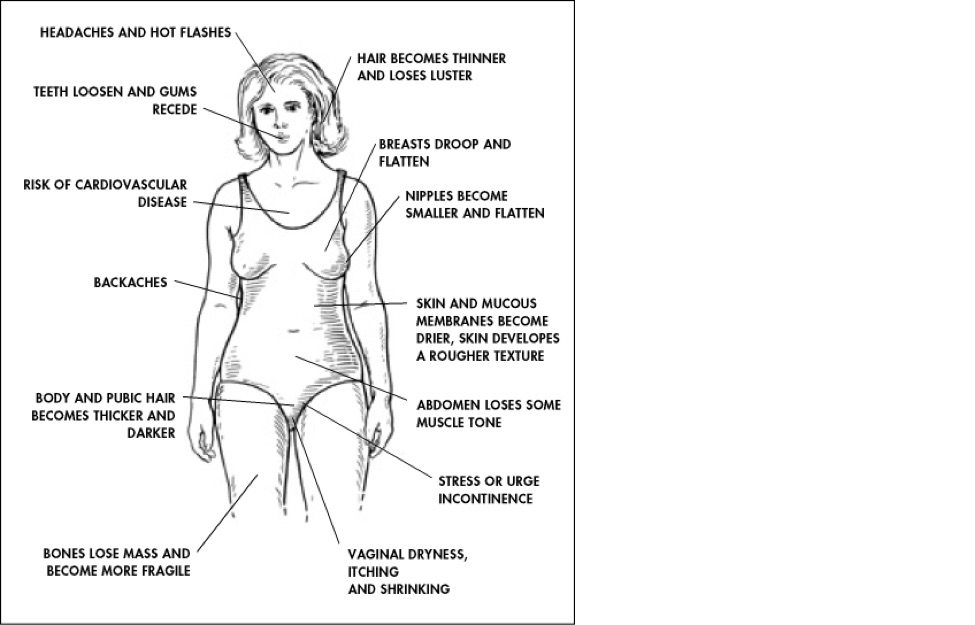Cessation of regular periods in women is called menopause, the average of attaining menopause is 45 years. It can happen early as well where some health benefits for Hormone replacement therapy (HRT) is there.
In severe menopausal syndromes, we use a short course of HRT but prolonged use is discouraged currently for side-effects.

Normal hormone cycle
The regular menstrual cycle attained at the time of puberty is an indication of activation of the biological clock and maturation of the Hypothalamus and Pituitary gland in women. This is the beginning of feminity, natures’ desire for continuation of the human generations.
The Change
Biological clock not only decides about the beginning, but it is also programmed for the end of the regular menstrual cycle. The usual time is around 45 years, in some women periods can continue up to 50 years.
This is a very important time for women as this is responsible for various physical and psychological changes.
Everybody’s sensitivity is not the same, while some women pass this phase silently others become symptomatic and can present themselves to various medical clinics with different complaints.
Usual symptoms are irritability, mood swing, hot flush, sweating, sleep disturbance, loss of appetite, loss or gain in weight, loss of libido, etc. Some women complain of feeling tired, looking aged, excessive skin creases and lack of memory.

Benefits of HRT
These symptoms are because of loss of ovarian oestrogen, so called female hormone. Oestrogen hormone is protective for bone. Lack of oestrogen after menopause makes women vulnerable for developing brittle bone disease, called osteoporosis.
In osteoporosis the chance of developing fractures increases in proportion to how brittle the bones are. Hormone Replacement Therapy (HRT), replacing the deficient oestrogen, is helpful for bones.
Also, it helps to get rid of the menopausal symptoms such as hot flushes, excessive sweating, mood swing, etc. The best benefit of HRT, we believe, is the feel-good factor.
Precautions to be taken
Two most important reasons for not recommending HRT are family history of breast cancer and history of thromboembolic diseases (clot in the legs called deep venous thrombosis or clot in the lungs called pulmonary embolism). The tests we recommend before starting are cervical smear and mammography. Obviously a good discussion with the prospective recipient of HRT is a must in each and every case.
How to take HRT?
Now days preparations are available with which you need not go through the harassment of regular periods. Skin patches have been developed to avoid gulping tablets daily, like the tablets you need to change the patch everyday once after bath.
The dose requirement is not the same for everybody and also a periodic check up is very much advisable.
Whom do you see for this?
Most women present themselves to Gynaecologists first, which is understandable and acceptable. Commonest speciality visited with osteoporosis is usually after a fracture and in the department of Orthopaedics. The most important aspect we believe is getting the right message, advice and treatment. At some point of time we are sure you should see Endocrinologist as this is all about hormones and Endocrinology is the speciality which deals with hormonal disorders.
Need for follow up
In the beginning little bit swelling feet can be there and you may gain a few kgs of weight, which over the time disappear. A local reaction to the skin patch is known in some women.
How long to continue is a very important question. At present we use HRT for severe menopausal symptoms of six months to 3 years. This oestrogen has nothing to do with estrogen replacement in premature ovarian failure.
Premature Ovarian Failure (POF)
What is POF?
Premature ovarian failure (POF) is defined as the cessation of ovarian function prior to the age of 40.
It is diagnosed in women under age 40 when ovarian function ceases, resulting in an end or pause in menstruation, the onset of menopausal symptoms, and a decline in the production of estrogen and eggs, resulting in infertility.
Is it the same as menopause?
Normal menopause occurs as a result of follicle depletion and the onset of menopause with related symptoms. With POF, up to 50% of patients may ovulate once in any given year and 5-10% may become pregnant, leading to a theory that there is a follicular dysfunction rather than complete ovarian failure.
POF is often associated with autoimmune disease, the most common being thyroid dysfunction (i.e., Hashimoto’s thyroiditis). These characteristics are not common to menopause with the cessation of ovarian function in the early fifties.
How do you confirm POF?
It is confirmed by laboratory investigations of LH and Estradiol. Low levels of Estradiol with high LH suggests POF in women < 40 years of age.
Is it necessary to treat POF? What are the treatment options ?
Estrogen is not only responsible for the normal menstrual cycle but has protective benefits on the bones and heart. This is probably the reason that more women develop bone-related problems and heart attacks after menopause than before.
Hence it is better that women with POF receive replacement therapy till the time of normal menopause.
Also see,